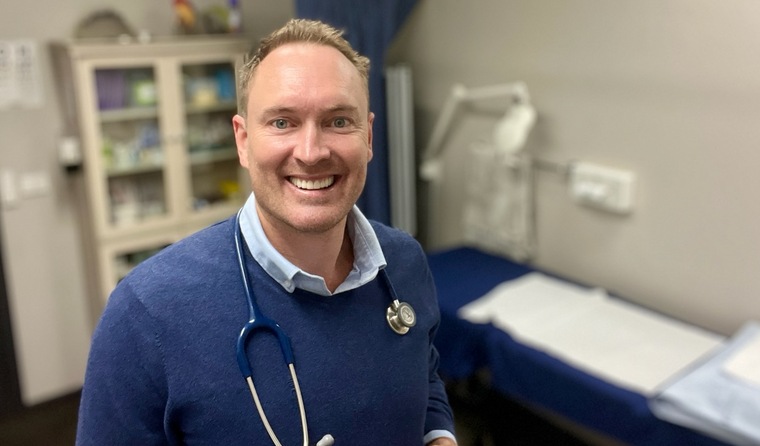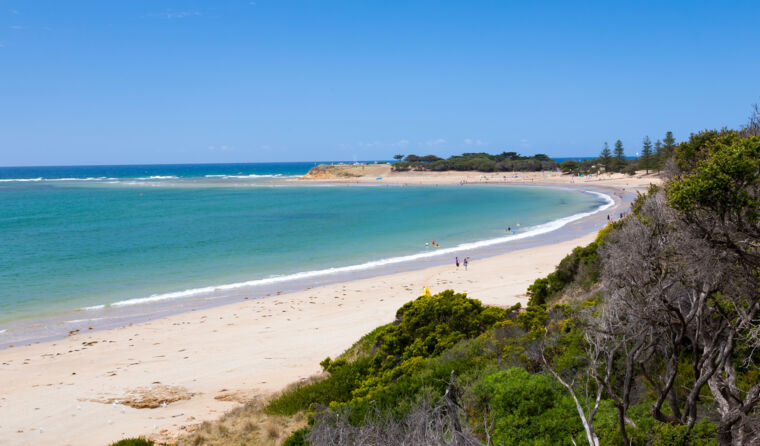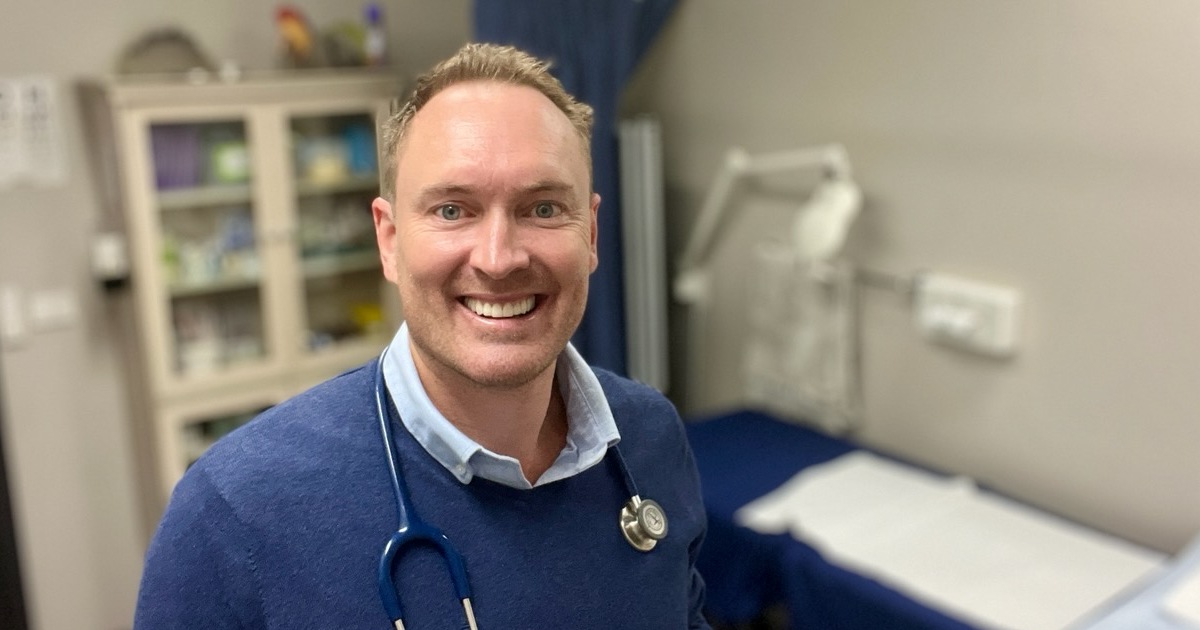News
A doctors’ support group helped Dr Tim Blake after addiction brought his life crashing down. Now, he hopes to inspire others in their darkest hour.

After a conscious decision to get his life back on track, Dr Blake is once again working as a doctor.
Dr Tim Blake can trace the exact moment his life appeared to fall apart.
It was 18 December 2020 and he was dropping in to a remote Arnhem Land post office to collect a parcel.
For five years, he had been working as a Rural Generalist at Gove Hospital in Nhulunbuy, a coastal community 1000 kilometres from Darwin, where the roads can become impassable in wet season.
‘I was working my dream job up there,’ he told newsGP.
‘It was high-octane stuff, being the senior doctor in-charge of a small hospital where help from aeromedical retrieval was at least four hours’ flight away.’
He had, however, been struggling under the weight of a secret no-one else knew or even suspected.
He had become addicted to stimulants, which he was ordering over the dark web. An anonymously shipped parcel of those drugs had been identified by police and tracked to his remote PO Box.
When he left the post office, he was arrested immediately and spent the night in a police cell.
Almost overnight, he had gone from a pillar of the community to facing criminal charges and being unable to practise as a doctor.
‘It was horrific, and I could not believe that life had turned in an instant like that,’ Dr Blake said.
‘It was utterly gut-wrenching to go through it all so publicly. Your identity is just torn apart, who you are and what sort of person you think you are.
‘It felt as though I had lost just about everything that was important to me at the time.’
He returned to Victoria and took refuge at his parents’ home on the south coast, supported by a family he describes as ‘incredible’.
As he waited for the slow-turning wheels of the Northern Territory’s judicial system, he had plenty of time to think.
‘I decided to do everything possible to understand myself better, why I had made such poor life choices and how I could begin turning my life around,’ he said.
Initially he says he found the prospect of rehab ‘incredibly confronting’ given he had not needed help detoxing.
However, Dr Blake now acknowledges he was naive about the many, varied paths towards recovery.
He credits rehab with ‘supercharging’ his understanding and acceptance of the seriousness of his past substance use.
It also helped dramatically shift his perspective. Instead of focusing on what he had lost, he says he began to feel grateful that intervention had happened as early as it did in a developing disorder.
Following rehab, he started to pursue other possible pathways towards recovery. These included psychologist and psychiatrist assessments, and an ADHD coach after he was diagnosed with the condition early in the process.
The role of Caduceus
Crucially, it also led to his decision to approach Caduceus, a support network for doctors recovering from substance abuse issues, which is run by the Victorian Doctors Health Program.
Its focus on clinicians was a big draw.
‘It’s quite a confronting thing to be in this situation as a doctor,’ Dr Blake explained.
‘There’s a significant additional level of humiliation and shame around the fact that I knew so much and yet still succumbed to the disorder.’
Following an initial consultation with a psychologist, he nervously joined the group, which is facilitated by an experienced psychotherapist.
He describes finding immediate relief in the opportunity to discuss his struggles openly with peers.
‘When you’re a new member, everyone does a brief share – around five minutes of their own story, and where they’re at in their journey,’ he said.
‘And that’s just such comfort to the soul, and that allows you to then unload your own burdens and all of your own feelings that you’ve been holding on to and be able to express it openly in a forum with others.’
This is, he believes, one of the fundamental steps on the road to recovery for those trying to cope with substance abuse issues in private.

Dr Blake found support from his ‘incredible’ family on Victoria’s Surf Coast.
‘You won’t be able to imagine how dramatic the transformation would be, how quickly that burden is reduced, how dramatically your internal view of yourself and carrying this shame around addiction is changed,’ he said.
‘That dark edge is quickly rounded off, and then that gives you the confidence to take further steps, if need be, in opening up whether it be to a loved one, to your doctor, or going to rehab.
‘You just can’t imagine why speaking about it with others is so therapeutic, but it just is.
‘It’s one of these intangible things. I would put it as important as any of the other aspects of my recovery, because of what it’s brought to me in being comfortable in my own skin through treating that underlying shame and guilt.’
It is not just Dr Blake who feels that way. One study of Caduceus published in the Australian Psychiatry journal in 2013 found those involved ‘overwhelmingly valued the support group’ and viewed it as ‘an essential part of their recovery and ongoing health’.
It also recommended support groups for doctors who have substance use disorders be more widely available.
As well as helping to deal with the stigma and shame, Dr Blake says the group has been a vital support for working with the Australian Health Practitioner Regulation Agency (AHPRA).
‘What I did learn from the group at the very start was a saying ‘resentment leads to relapse’, and a lot of people have struggled with that resentment towards AHPRA and the medical board,’ he said.
That lesson was reinforced in the starkest possible terms when a doctor he knew from university and who had also been part of the group took his own life.
‘For me, it’s been a huge part of my life managing this process with AHPRA, but it’s just trying to work through the steps and not to take it personally,’ Dr Blake said.
‘It’s easy to fall into that dangerous trap of feeling victimised and the group has been pivotal in helping each other identify and avoid this.’
He also recognises the deep fear faced by doctors if they disclose their substance use but stresses the confidentiality of Caduceus – and the risks of not seeking help.
‘I held an intense fear that if I asked for help then AHPRA would be notified, utterly terrifying,’ he said.
‘That’s unfounded. If you are seeking help, taking leave when not fit for work and/or making appropriate adjustments to practice so as not to risk harming patients, then the mandatory notification laws don’t apply.
‘That’s something that is really important to let people know.
‘There’s lots of people that attend that are not in any way on the books of AHPRA. But not getting help and continuing like many of us did, that then becomes mandatory.’
For Dr Blake, the hardest part is over. The Northern Territory justice system has run its course, with its Supreme Court giving him a 12-month suspended sentence in 2022.
In July the Medical Board gave him the green light to return to a practice as a GP, with strict initial conditions attached.
He now hopes that by both speaking out and carrying on his connection to the support group, others may draw strength from his experience.
‘My intent is to continue indefinitely at Caduceus,’ he said.
‘I’m always going to be getting benefit from it, and it’s also a way of really contributing to the health and wellbeing of others who are navigating the same path as I did.’
Now, his future looks very different from that moment when everything seemed to collapse around him in Arnhem Land.
He began work as a GP on the surf coast of Victoria in late July – and Dr Blake has loved the return to clinical duties even more than he anticipated.
‘Working as part of a team within a busy clinic has been something I missed so much,’ he said.
‘I am really looking forward to gradually getting to know my regular patients as I see them more and more. It’s fantastic, being back in the system and working.
‘I’ve always loved the career.’
Caduceus is a support group for doctors with substance use issues run through the Victorian Doctors Health Program, which can be contacted on 1300 330 543.
DRS4DRS is an independent program providing confidential support and resources to doctors and medical students across Australia.
Its website provides coordinated access to mental health and wellbeing resources, training on becoming a doctor for doctors, community news and navigation to each state and territory helpline and referral services. Confidential phone advice is available 24/7 for any doctor or medical student in Australia.
See drs4drs.com.au.
Log in below to join the conversation.
addiction Caduceus Drs4Drs mental health substance abuse disorder
newsGP weekly poll
How often do your patients inquire about DNA screening?

